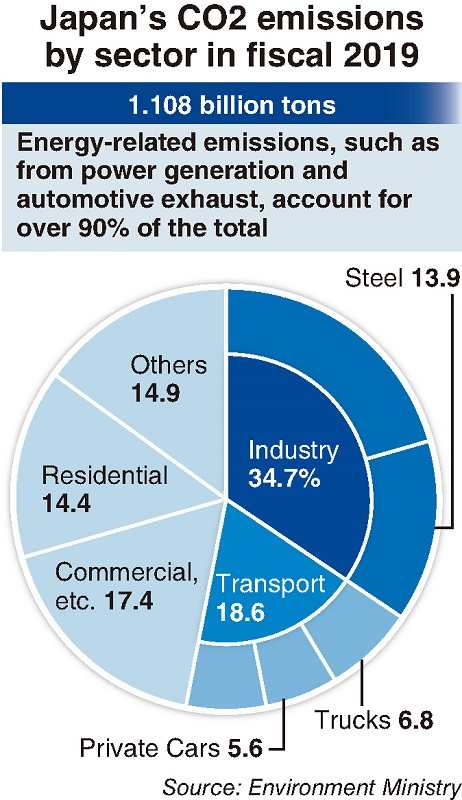
16:51 JST, April 22, 2021
It is important for the public and private sectors to work in tandem to achieve the new greenhouse gas emissions reduction targets.
At a press conference on Tuesday, Toru Nozawa, chairman of the Japan Paper Association, called for stronger government support, including subsidies to ease the way to decarbonization, with the expectation that the government will raise its emissions reduction target for fiscal 2030.
“Targets that put too much pressure on industries will result in a loss of international competitiveness,” said Nozawa, who is also the president of Nippon Paper Industries Co. “Building up reduction targets and support measures should be combined.”
The industrial sector is Japan’s largest emitter of carbon dioxide (CO2) by sector.
In the steel industry, the global economic downturn caused by the spread of the novel coronavirus has led to a series of shutdowns of blast furnaces, the main equipment used for steelmaking. If this situation continues, the steel industry may not be able to raise the huge amount of money needed for research and development of new technologies that emit less carbon and for the replacement of equipment.
According to the Environment Ministry, Japan’s CO2 emissions were about 1.1 billion tons in fiscal 2019. Of this amount, 90% came from energy-related emissions such as from power plants and gasoline consumption.
With only nine years left until fiscal 2030, it is unclear how much progress will be made in expanding the use of renewable energy sources. Also, the development of technologies to utilize next-generation energy sources such as hydrogen and ammonia is still not fully advanced.
On Thursday, Hiroaki Nakanishi, chairman of the Japan Business Federation (Keidanren), released a statement on achieving the target in fiscal 2030. “It is essential to steadily restart nuclear power plants whose safety has been confirmed and to expand and newly build such plants,” Nakanishi said.
The government needs to clearly indicate the direction of its energy policy, including the use of nuclear power plants that do not emit CO2.
Top Articles in Business
-

Prudential Life Insurance Plans to Fully Compensate for Damages Caused by Fraudulent Actions Without Waiting for Third-Party Committee Review
-

Narita Airport, Startup in Japan Demonstrate Machine to Compress Clothes for Tourists to Prevent People from Abandoning Suitcases
-

Japan, U.S. Name 3 Inaugural Investment Projects; Reached Agreement After Considerable Difficulty
-

JR Tokai, Shizuoka Pref. Agree on Water Resources for Maglev Train Construction
-

Toyota Motor Group Firm to Sell Clean Energy Greenhouses for Strawberries
JN ACCESS RANKING
-

Japan PM Takaichi’s Cabinet Resigns en Masse
-

Japan Institute to Use Domestic Commercial Optical Lattice Clock to Set Japan Standard Time
-

Israeli Ambassador to Japan Speaks about Japan’s Role in the Reconstruction of Gaza
-

Man Infected with Measles Reportedly Dined at Restaurant in Tokyo Station
-

Videos Plagiarized, Reposted with False Subtitles Claiming ‘Ryukyu Belongs to China’; Anti-China False Information Also Posted in Japan




















